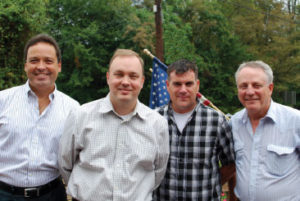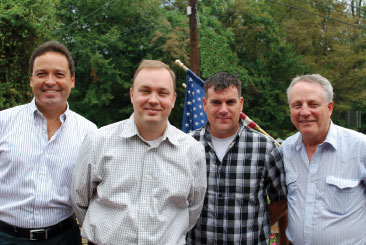by Ed Malaga, President, Local 161-710 (Washington, DC)

(L to R) Local 161-710 President Ed Malaga with Musicians for a Stronger Olney Theater committee members Patrick Plunk, Craig Taylor, and George Hummel.
After a six-month campaign, musicians at Olney Theatre in Maryland overwhelmingly voted to unionize in a National Labor Relations Board (NLRB) election. Musicians are now working with AFM Local 161-710 (Washington, DC), preparing for their first collective bargaining agreement. The victory is an important first step in Local 161-710’s organizing plan.
The story is a common one. Musical theater productions have been a key factor in Olney Theatre’s recent growth. Yet musicians’ wages had not increased in years and unsafe working conditions were a growing concern. Musicians chose to take action. A dedicated group of musicians formed an organizing committee—Musicians for a Stronger Olney Theatre Committee—to lead the effort.
Working with the local’s leadership and the AFM’s Organizing & Education Division (O&E), the musicians developed a campaign plan and mobilized their co-workers to win a decisive victory. By sticking together, musicians at the Olney Theatre will now enjoy the same rights as union actors, directors, choreographers, and scenic artists who work at the theater.
The successful organizing effort at the Olney Theatre required a comprehensive strategy and approach. Here are some key points that were critical to our success:
1) Understanding our base of support. Communication between the local’s leadership and its members was crucial. Members have the inside story regarding the relationship between the employer and the employees. Accessing this information and understanding the commitment of these members was critical. Building on these lines of communication during the organizing campaign and the resulting dialogue with Olney Theatre musicians cannot be overstated. One-on-one conversations are key to winning campaigns.
2) Knowing the importance of a relationship with our Central Labor Council. Our connections with Metro DC AFL-CIO were an invaluable resource in assessing the support of elected officials who had close ties with labor. We scheduled meetings with these officials to outline our case for union representation. Their support played an important role and we look forward to a continued relationship.
3) National Labor Relations Board (NLRB) election rule changes. New rules significantly expediting NLRB election timelines went into effect in April. The election process used to take months with numerous delays instigated by employers to undermine campaigns. Now elections can happen in a matter of weeks. We filed our petition for an election June 17 and the final vote count was July 28.
Musical theaters employ many AFM musicians and this area of work is growing. The contributions of these musicians to the success of musical theater productions should not be undervalued. Musicians should know that there are options available to them for winning union recognition and gaining a collective bargaining agreement. Organizing is hard work, but well worth it. Local leadership should work closely with rank-and-file musicians who want to organize and take advantage of the expertise available from the AFM O&E Division, which provided valuable training and assistance throughout our campaign.
Musicians standing together have power!


